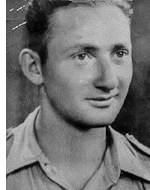Anzelevitz, Nathan
Son of Rivka and Anshel. Nathan was born in the city of Khust, Czechoslovakia, on the 13th of Sivan, 1929. He attended the elementary school in his hometown. A sign in Czech, Hungarian, and Russian. In 1943, the Nazis deported Nathan and his father Anshel to the extermination camps. Anshel, a well-to-do merchant and devoted family man, said Psalms and waited for the salvation of God. The Nazis separated the father from his son. They sent the father to an extermination camp and Nathan to a labor camp. One day the Germans ordered Nathan and his comrades to dig individual trenches. The Nazis murdered all the Jews and buried them in the trenches. Nathan managed to slip away for a piece of bread. After the war, Nathan returned to Czechoslovakia, joined the Youth Aliyah and planned to immigrate to Israel. On a shaky ship the boys approached the shores of the country. British soldiers boarded the ship and the ship changed its direction toward the detention camps on Cyprus. In 1947 Nathan came to Israel, joined Kibbutz Yagur and worked in fishing, carpentry and agriculture. Nathan joined the IDF in 1948, served in the 51st Battalion of the Givati Brigade, completed a course for commanders and a sergeant course and even spent several months in the army. After his release he lived in Jaffa and worked in carpentry. In 1951 Nathan married Chana, a young immigrant from Syria. In 1953 he enlisted in the Border Police. “I love the uniform, I am a military man,” he said to Hannah, and left for a six-month course. Hannah was pregnant at the time, expecting the oldest child. After they were born, they named him Anshel, after Nathan’s father. Nathan was a dedicated family man. He planned to buy a large apartment and expand the family. In his free time he liked to play with his son Anshel, or play basketball and volleyball. He practiced rope-pulling and running away, loved to go hunting. He was a talented, athletic guy. Over time, the family moved to a home in Ramle. Nathan served in Border Police Company C. He divided his time between the house and the work, and the infiltrators and Fedayeen infiltrated the borders of the country for robbery and murder, What would happen to the Fedayeen? “Nathan would answer:” I keep the secrets of the work in my police box. “On April 18, 1956, Nathan fell, and his immediate commander, Haim Levy, Border Police Commander: “Border Police observation area around Nahal Rubin in the Negev spotted a Fedayeen squad hiding in the sand, and the Border Police surrounded the area all night long. At dawn, the force began to survey the area with scouts, riders, and light aircraft. The footprints led to a thick grove. During the search, our forces opened fire. Fire was restored and two fedayeen were liquidated. The unit was deployed again, Nathan recognized a Fedayeen man and pressed the Uzi trigger. The Fedayeen was hurt but managed to hit Natan and kill him. “Nathan’s friends said:” He did not have to go to the same action, he volunteered because he thought he knew the area better than his other friends. “Sergeant Shani Natan was twenty-seven years old when he died. , Thousands gathered in the square of the police station and participated in the big funeral, and he was buried in the cemetery in Kiryat Shaul, Tel Aviv.
